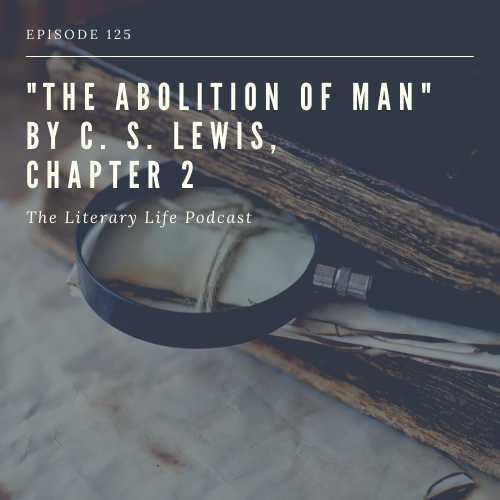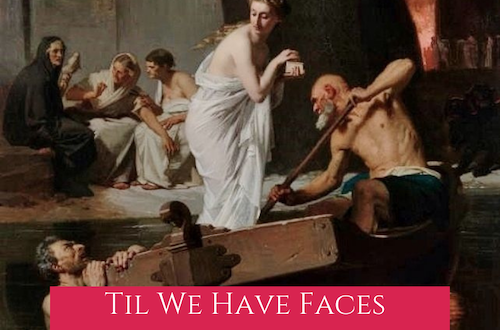
Episode 125: “The Abolition of Man” by C. S. Lewis, Ch. 2
On The Literary Life podcast this week, Angelina, Cindy and Thomas continue their series of discussions on The Abolition of Man by C. S. Lewis. They open the conversation with their commonplace quotes and give us a working definition of debunking. You can also read a fantastic post on debunking from Kelly Cumbee’s blog here. Other topics of this conversation include “the tao,” objective reality, utilitarianism, finding wisdom, and how this book speaks to our current culture.
Kelly Cumbee will be teaching a webinar on The Tempest by William Shakespeare this Thursday, March 17, 2022 at 5pm Eastern, so head over to HouseofHumaneLetters.com to register today.
Join us this spring for our next Literary Life Conference “The Battle Over Children’s Literature” featuring special guest speaker Vigen Guroian. The live online conference will take place April 7-9, 2022, and you can go to HouseofHumaneLetters.com for more information.
Listen to The Literary Life:
Commonplace Quotes:
An ounce of mother is worth a pound of clergy.
A Scottish proverb, as quoted by Joseph Addison
“Well, at any rate there’s no Humbug here. We haven’t let anyone take us in. The Dwarfs are for the Dwarfs.”
“You see,” said Aslan. “They will not let us help them. They have chosen cunning instead of belief. Their prison is only in their own minds yet they are in that prison; and so afraid of being taken in that they cannot be taken out.”
C. S. Lewis
Do not remove the ancient landmark which your fathers have set.
Proverbs 22:28 (NKJV)
Inexpensive Progress
by John Betjeman
Encase your legs in nylons, Bestride your hills with pylons O age without a soul; Away with gentle willows And all the elmy billows That through your valleys roll. Let's say goodbye to hedges And roads with grassy edges And winding country lanes; Let all things travel faster Where motor car is master Till only Speed remains. Destroy the ancient inn-signs But strew the roads with tin signs 'Keep Left,' 'M4,' 'Keep Out!' Command, instruction, warning, Repetitive adorning The rockeried roundabout; For every raw obscenity Must have its small 'amenity,' Its patch of shaven green, And hoardings look a wonder In banks of floribunda With floodlights in between. Leave no old village standing Which could provide a landing For aeroplanes to roar, But spare such cheap defacements As huts with shattered casements Unlived-in since the war. Let no provincial High Street Which might be your or my street Look as it used to do, But let the chain stores place here Their miles of black glass facia And traffic thunder through. And if there is some scenery, Some unpretentious greenery, Surviving anywhere, It does not need protecting For soon we'll be erecting A Power Station there. When all our roads are lighted By concrete monsters sited Like gallows overhead, Bathed in the yellow vomit Each monster belches from it, We'll know that we are dead.
Book List:
The Last Battle by C. S. Lewis
That Hideous Strength by C. S. Lewis
Support The Literary Life:
Become a patron of The Literary Life podcast as part of the “Friends and Fellows Community” on Patreon, and get some amazing bonus content! Thanks for your support!
Connect with Us:
You can find Angelina and Thomas at HouseofHumaneLetters.com, on Instagram @angelinastanford, and on Facebook at https://www.facebook.com/ANGStanford/
Find Cindy at morningtimeformoms.com, on Instagram @cindyordoamoris and on Facebook at https://www.facebook.com/cindyrollins.net/. Check out Cindy’s own Patreon page also!
Follow The Literary Life on Instagram, and jump into our private Facebook group, The Literary Life Discussion Group, and let’s get the book talk going! http://bit.ly/literarylifeFB
Subscribe to The Lit Life:









One Comment
Veronica
I couldn’t help but remember the exchange between Hal and Falstaff in Henry IV pt. I about “reason” and “instinct.” I don’t know if it really connects, but it is a great scene nonetheless.
I have heard a few people say this, and I think it was originally Peter Kreeft, who described I Did it My Way as the anthem of Hell. That really seems like what Dante and Lewis illustrate.